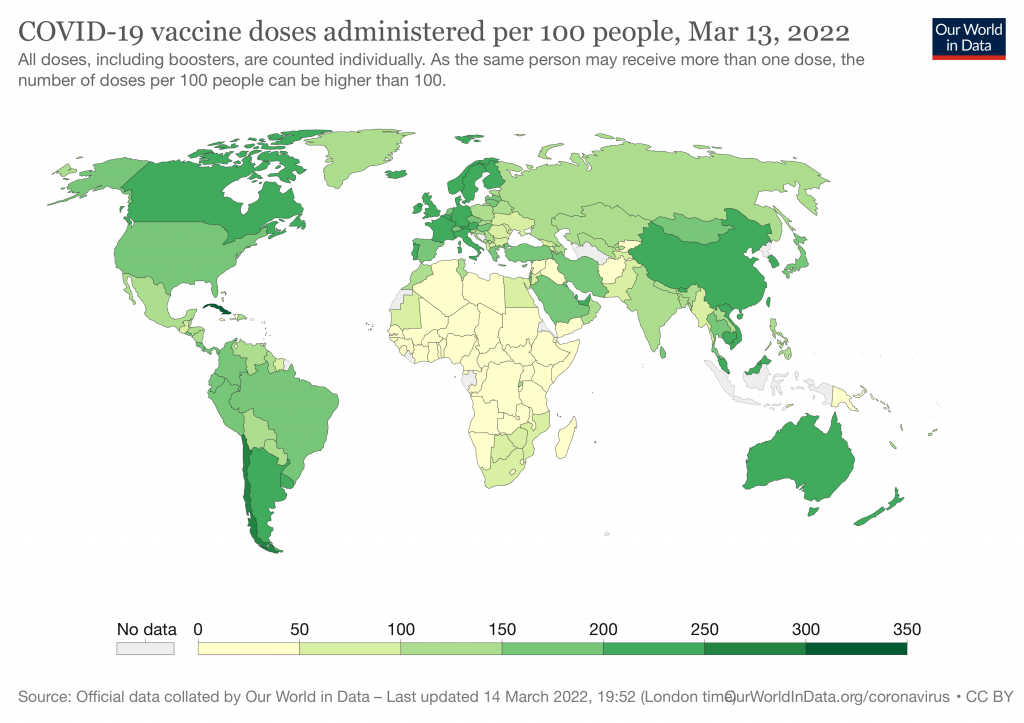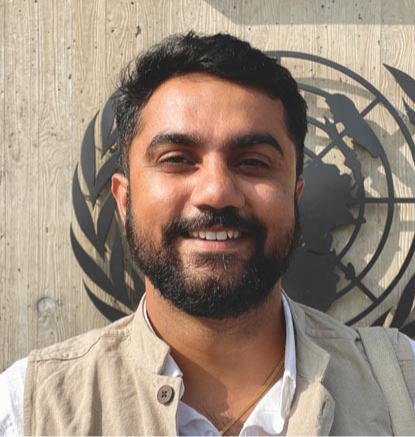-
CENTRES
Progammes & Centres
Location
The COVID-19 response is forcing us to reimagine global institutions and their commitments.

The pandemic is not over yet. About 2.9 billion people are still waiting for their primary dose of the COVID-19 vaccine. The crisis precipitated by Russia’s special military operation in Ukraine has diverted public attention and is causing a ripple effect on the multilateral institutions and global interconnectedness. The Ukraine crisis has the potential to further complicate an already weak and ineffective global response for providing equitable access to essential medicines and vaccines to the developing countries. Debates regarding public health and access to medicine have garnered astonishing international attention; however, the momentum built to address the challenges of global health and the pandemic is likely to be undermined by the unfolding of the balance-of-power conflict in Ukraine.
Weakening international cooperation, due to the Russia-Ukraine conflict, would certainly destabilise the functioning of the multilateral bodies, which are in the midst of discussions on issues critical to response and management of the COVID-19 pandemic. Amongst these issues, the most important is a resolution on India and South Africa’s proposal to waive Intellectual Property Rights (IPRs) on COVID-19 vaccines for the duration of the pandemic. The members of the World Trade Organization (WTO) have been deliberating on the proposal since October 2020, and a watered-down resolution might be on the horizon. In the absence of a much-awaited solution for a faster and cheaper route to global vaccination, pharmaceutical giants continue to make record profits from the COVID-19 vaccines.
Weakening international cooperation, due to the Russia-Ukraine conflict, would certainly destabilise the functioning of the multilateral bodies, which are in the midst of discussions on issues critical to response and management of the COVID-19 pandemic.
While the COVID-19 pandemic exposed the global unpreparedness to address public health emergencies, the Ukraine crisis reminds us of our fragile post-World War order and peace. This article argues that while the COVAX and other arrangements to vaccinate the world’s most vulnerable have failed, global efforts are still required to eradicate the COVID-19 pandemic by addressing the inequities in people’s access to the COVID-19 vaccines through a just and fair TRIPS waiver. Any narrative to insist that the pandemic is over without ensuring mass vaccination in developing countries is both morally and ethically wrong. Failure to support the vulnerable communities in the developing countries to fight the pandemic could lead to another excruciating humanitarian crisis.
In its global COVID-19 vaccines strategy, the World Health Organization (WHO) pledged to vaccinate 70 percent of the population in low and lower-middle-income countries by June 2022 through COVAX and other coalitions. As of 31 January 2022, the WTO International Monetary Fund’s COVID-19 Vaccine Trade Tracker data projects that about 71.4 percent of the population in high-income countries and 68.7 percent in upper-middle-income countries are fully vaccinated. In contrast, only 6 percent of the people in low-income countries and 39.9 percent in lower-middle-income countries are fully immunised (See Figure 1).
Figure 1: COVID-19 vaccination data Source: Our World in Data
Source: Our World in Data
The COVAX facility, an initiative formed by the Coalition for Epidemic Preparedness Innovation, GAVI: The Vaccine Alliance and the World Health Organisation (WHO), positioned itself as a global vaccine-sharing hub. However, the donor countries’ political interests and diplomatic struggles curbed the effectiveness of COVAX’s multilateral dose-sharing mechanism, and thus, failed to deliver on most of their donation pledges. Now, the collective apathy of developed countries in supporting vaccination in developing countries, either through COVAX or other mediums, is pushing the target of achieving mass immunisation against COVID-19 to late-2024. As United Nations Independent Expert on Human Rights and International Solidarity, Obiora C Kafor stated, “This pandemic will not end for anyone, until it ends for everyone”.
The COVAX facility, an initiative formed by the Coalition for Epidemic Preparedness Innovation, GAVI: The Vaccine Alliance and the World Health Organisation (WHO), positioned itself as a global vaccine-sharing hub.
The primary factor for slow vaccination in developing countries remained the limited manufacturing of vaccines due to the persistent monopoly of the pharmaceuticals on production, through patent rights. WHO could have successfully met its June-2022 target through COVAX if the leaders had unequivocally supported public health over private monopolies on the COVID-19 vaccine and IPRs debate.
The IPRs landscape, more specifically the patent rights obligation under Trade-Related Aspects of Intellectual Property Rights (TRIPS) Agreement and access to medicine—a continuous conflict between WTO and Human Rights law, remained the most contested domain in the last two years. From the beginning of the pandemic, the IPRs holders strictly controlled their technology and manufacturing knowledge on testing kits, ventilators, and essential medicines from the large pool of manufacturers in the developing countries. Along with pharmaceuticals, universities and research organisations also hold a record number of patents on COVID-19 therapeutics and vaccines, and continue to receive benefits from patent monopoly. Figure 2 highlights the number of patents registered by different actors in the early period of the COVID-19 pandemic.
Figure 2: Patent applicant profiles from Jan 2020 to September 2021
Source: World Intellectual Property Organization
The present difficulties faced by developing countries in accessing affordable COVID-19 vaccines is similar to the historical injustice perpetrated by developed countries in the HIV/AIDS epidemic through patent monopoly. To improve access to medicine, the United Nations Secretary General’s High-Level Panel on Access to Medicine, in a 2016 report, provided a set of recommendations to address imbalances and ineffective IPRs regimes. However, these recommendations were not considered during the 74th World Health Assembly (WHA) on local production of life-saving/essential medicines. While the May 2020 WHA resolution pledged a global vaccine action plan, it failed to resolve a mechanism to achieve sustainable vaccine supplies in developing countries—given the IPRs restraints.
Following the WHA resolution, in October 2020, India and South Africa moved a proposal to the WTO, in accordance with Article IX of the Marrakesh Treaty establishing the WTO, for temporary suspension of key TRIPS Agreement rules.
The opponents argue that the WTO agreement on TRIPS provides for compulsory licensing which could be used by the developing countries to manufacture generic vaccines.
All decisions at the WTO are made by consensus, and even a small number of countries can thwart the will of the majority, even a supermajority. Now, the waiver proposal is sponsored by 58 governments and has received the support from over 100 countries; however, a small number of countries, mainly from the European Union, continue to oppose the proposal. The defenders of the proposal contend that with the patent waiver, developing countries would produce cheaper generic versions of COVID-19 vaccines. Whereas, the opponents argue that the WTO agreement on TRIPS provides for compulsory licensing which could be used by the developing countries to manufacture generic vaccines. However, it is important to point out that the transfer of technology or trade secrets by the inventor to other producers is not compulsory under the compulsory license. Developing such a new compulsory mechanism that addresses complications related to trade secrets will be a long process. Thus, an agreement on the exceptional patent waiver on the COVID-19 vaccine is necessary to break the deadlock. The map below (Figure 3) visualises the current position of countries on the TRIPS waiver.
Figure 3: Countries’ position on TRIPS waiver proposal
Source: Médecins Sans Frontiéres
POLITICO reported that the European Union, India, South Africa, and the United States are purportedly reaching a breakthrough TRIPS waiver resolution. It has been widely reported that the terms of reference of the TRIPS waiver resolution are limited only to the COVID-19 vaccines only. The draft resolution under consideration does not cover any concessions on trade secrets, undisclosed clinical trial data, and COVID-19 drugs and diagnostic devices. The draft resolution, which is currently under domestic scrutiny of the four negotiators, would still need a unanimous approval from all the WTO members. The WTO is set to hold its 12th Ministerial Conference in June 2022. It is likely that the trade ministers of the member states will push the deliberations on the resolution for TRIPS waiver on the COVID-19 vaccine towards a final agreement. Though there are many shortcomings and concerns in the current form of the draft resolution under consideration, however, if accepted, the TRIPS waiver on COVID-19 vaccines will be the first of its kind and a significant leap in the fight for equitable access to medicines and life-saving drugs.
As of now, about 30 million people are put under lockdown in China, and a TRIPS waiver on COVID-19 vaccines is likely. Lately, developed countries which have been able to vaccinate their populations were building the narrative that the global pandemic is over, and therefore, no emergency response is justified or needed anymore. On the contrary, the unequal distribution of vaccines and the crisis in Ukraine are prolonging the pandemic, thus increasing the risk of virus mutation and reducing the ability to control the pandemic.
The COVID-19 pandemic is certainly not over yet. Despite the remarkable medical achievement of developing multiple COVID-19 vaccines in a short time, the disproportionate extent to which vaccines have been accessible and distributed amongst developed and developing countries shows global inequalities. The developed countries should stop hoarding vaccine doses and actively resolve the deadlock at the WTO to adopt a just and fair TRIPS waiver on COVID-19 vaccines. COVID-19 should not become a developing countries’ disease. Humanity deserves a better response, and the world should provide it.
The views expressed above belong to the author(s). ORF research and analyses now available on Telegram! Click here to access our curated content — blogs, longforms and interviews.

Nishant Sirohi is an advocate and a legal researcher specialising in the intersection of human rights and development - particularly issues of health, climate change, ...
Read More +